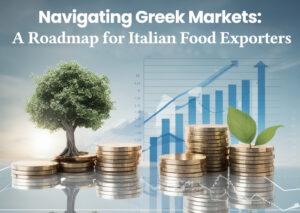The bond between Italy and Greece is steeped in a shared Mediterranean heritage, from art and culture to their celebrated cuisines. This deep connection makes Greece a fertile ground for Italian exports, particularly in the food and beverage sector. With Greece’s economy showing steady growth and its demand for high-quality imports increasing, Italian businesses have an exceptional opportunity to expand their reach.
This article explores why Greece is an ideal market for Italian exporters, the factors driving this potential, and strategies Italian businesses can adopt to maximize their impact.
Why Greece is a Strategic Market for Italian Exporters
- Proximity and Shared Culture
The geographical closeness between Italy and Greece facilitates trade. Both countries have maritime access to each other’s ports, enabling cost-effective and efficient transportation of goods. Furthermore, their shared Mediterranean culture creates a natural affinity for Italian products among Greek consumers. Greek consumers are familiar with—and often loyal to—Italian brands that align with their culinary traditions and lifestyle. - Economic Recovery and Increased Spending Power
After a challenging economic decade, Greece’s recovery is underway. The nation has shown robust growth in sectors such as tourism, which fuels demand for imported goods, especially high-quality food and beverages. With disposable incomes gradually rising, Greek consumers are more willing to spend on premium, imported products like Italian wines, cheeses, and olive oils. - Tourism as a Growth Catalyst
Greece welcomed over 27 million international visitors in 2022, solidifying its position as a top tourist destination. Italian products are particularly sought after in the hospitality sector, where luxury resorts and fine-dining establishments cater to international guests who demand diverse, high-quality culinary experiences.
The Strength of Italian Products in Greece
Italian food and beverages enjoy a stellar reputation worldwide, and Greece is no exception. Key factors contributing to their success include:
- Superior Quality and Authenticity
Greek consumers prioritize authenticity, making Italian products a natural fit. Designations such as DOP (Protected Designation of Origin) and IGP (Protected Geographical Indication) provide a mark of quality that Greek consumers trust. Italian exporters of Parmigiano-Reggiano, Prosciutto di Parma, and Chianti wines have successfully leveraged these certifications to build brand credibility. - Alignment with Greek Preferences
Italian cuisine resonates deeply with Greek consumers due to the shared Mediterranean diet. Products like pasta, olive oil, and wine are staples in Greek households, and Italian varieties often stand out for their artisanal quality. - Versatility in the Hospitality Sector
Greek restaurants and hotels increasingly incorporate Italian ingredients into their menus. Mozzarella di Bufala, balsamic vinegar, and Italian wines are frequent features in high-end dining establishments, reflecting the strong demand for these imports.
Challenges and Opportunities in the Greek Market
- Navigating Competitive Landscapes
While Italian products are highly regarded, they face competition from both local Greek brands and other European imports. Italian exporters must position their products strategically, emphasizing their unique value propositions such as sustainability, organic production, or heritage. - Regulatory Compliance
Greek import regulations and EU standards can be complex for first-time exporters. Italian businesses should ensure that their labeling, packaging, and documentation meet all requirements to avoid delays or penalties. - Tapping into Evolving Consumer Trends
Greek consumers are increasingly conscious of health and sustainability. Italian exporters offering organic, gluten-free, or plant-based products can tap into this growing demand and differentiate themselves in the market.
The Role of the Italian Food and Beverage Exhibition
The upcoming Italian food and beverage exhibition in Greece is a pivotal event for Italian businesses. It provides an unparalleled platform to showcase their offerings, build connections, and gain insights into the Greek market. Key benefits of participating include:
- Direct Access to Stakeholders
The exhibition attracts distributors, retailers, restaurateurs, and hospitality professionals, offering Italian exhibitors the opportunity to establish relationships with influential decision-makers. - Showcasing Innovation
Exhibitors can highlight their latest products, from traditional specialties to innovative offerings such as eco-friendly packaging or novel flavor profiles. - B2B Networking and Collaboration
Structured networking sessions and one-on-one meetings facilitate meaningful interactions with potential partners, increasing the likelihood of securing deals. - Regional Visibility
Greece is a gateway to the Balkans and Southeastern Europe. By participating in the exhibition, Italian businesses can gain exposure to a broader regional audience, opening doors to neighboring markets.
Strategies for Success
Italian exporters should approach the Greek market with a well-planned strategy to maximize their chances of success at the exhibition and beyond:
- Research and Adaptation
- Conduct in-depth market research to understand Greek consumer preferences.
- Tailor product offerings to align with local tastes and trends, such as introducing Mediterranean-friendly variations or packaging.
- Effective Marketing and Branding
- Highlight the heritage and authenticity of Italian products through storytelling.
- Use social media, digital campaigns, and collaborations with Greek influencers to generate buzz before the exhibition.
- Investing in Presentation
- Create engaging booth designs that reflect Italian craftsmanship and quality.
- Offer samples, live demonstrations, or interactive experiences to capture visitor interest.
- Building Relationships
- Prioritize relationship-building with Greek partners, as trust and personal connections are crucial in Greek business culture.
- Follow up promptly with potential buyers or distributors after the exhibition.
The synergy between Italy and Greece is a celebration of shared heritage, quality, and culinary excellence. For Italian exporters, Greece represents a dynamic and growing market with immense potential. The upcoming Italian food and beverage exhibition in Greece is a golden opportunity for businesses to showcase their offerings, build meaningful relationships, and navigate a promising market.
By adopting strategic approaches and leveraging the unique advantages of the exhibition, Italian exporters can unlock their full potential in the Greek market, paving the way for sustained growth and mutual success.






